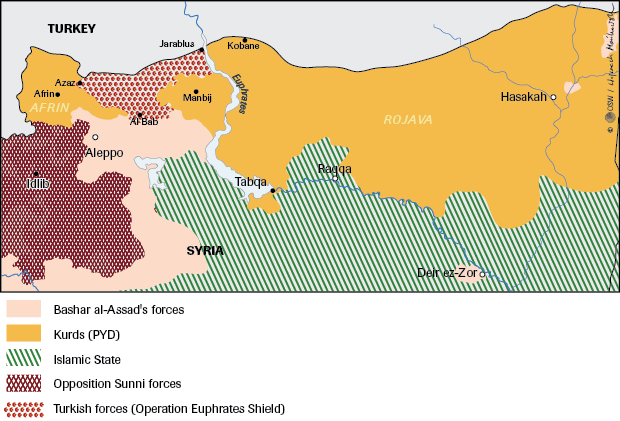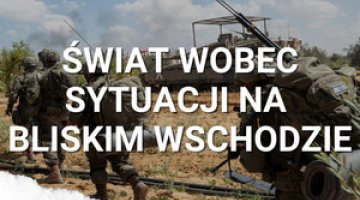Russian-Turkish tension with Kurds in the background
The past week has seen the first political tensions in Turkish-Russian relations for a year. The direct cause of this was the report on 20 March that a Russian military base had been opened in the Syrian district of Afrin, which is controlled by the Democratic Union Party (PYD, closely linked to the Kurdistan Workers’ Party). Moscow denied these reports, but Russia’s cooperation with the PYD has been confirmed, as has the limited presence of Russian forces in Afrin. The situation was exacerbated by the death of a Turkish soldier in a clash with PYD forces from Afrin (23 March). Russia’s cooperation with the PYD has met fierce criticism from the President of Turkey Recep Tayyip Erdoğan, politicians and the Turkish media, and the Russian chargé d’affaires in Ankara was summoned to the Turkish Foreign Ministry to offer an explanation.
Commentary
- The district of Afrin is a small Kurdish exclave, in Aleppo province in the west of the country, which is cut off from the rest of the areas controlled by the PYD. Despite its small size (around 2000 km2 and with a pre-war population of about 200,000 inhabitants) this area is of strategic importance: it is bordered by areas controlled by all the actors present in northern Syria. The risk of the PYD linking up Rojava and Afrin in August 2016 was the main cause of the Turkish military intervention in Syria. In contrast to Rojava, there are no US forces in Afrin; the US has distanced itself from the Afrin question since the district could not be used in the fight against Islamic State, as well as Turkey’s serious opposition to the presence of PYD forces west of the Euphrates. There has been speculation since 2015 regarding the presence of Russian forces in Afrin, although hitherto the presence of special forces there had been assumed.
- The current tensions and Russia’s support for the PYD in Afrin are part of two broader trends. The first is Russia’s attempts to delay the US-supported Kurdish offensive on Raqqa, the capital of the so-called Islamic State, by provoking an escalation of the PKK/PYD’s conflict with Turkish forces, aimed at getting the PYD to draw its forces away from Raqqa. The second is the launch of Russia’s rivalry with the United States for the strategic patronage of the PYD: while Russian influence in Rojava is small, and the scale of America’s support and presence there has hitherto guaranteed the Kurdish forces’ loyalty to the United States, Afrin has de facto become a Russian client.
- The increased tensions between Russia and Turkey, which in the West had been at times perceived as an alliance, show their changeability and the tactical nature of the cooperation between the two countries. Although Syria is only one element of the very complex Turkish-Russian relationship, Syrian issues have been decisive in the overall dynamics and climate of this relationship over the last two years. The parties have conflicting strategic interests in Syria, something which has caused major crises in the past. At the same time, Ankara and Moscow are ready to cooperate to a limited, tactical degree (for example, Russia’s consent to the creation of a Turkish security zone, and Turkey’s consent to the evacuation of Aleppo). Today, it is the Russian side which can adjust the level of tension; it is possible this will be escalated further in the near future (especially in the context of the Raqqa operation and the visit of the American Secretary of State Rex Tillerson to Turkey on 30 March). However, this does not preclude the revival of Russian-Turkish cooperation in Syria at a later period.
Map





